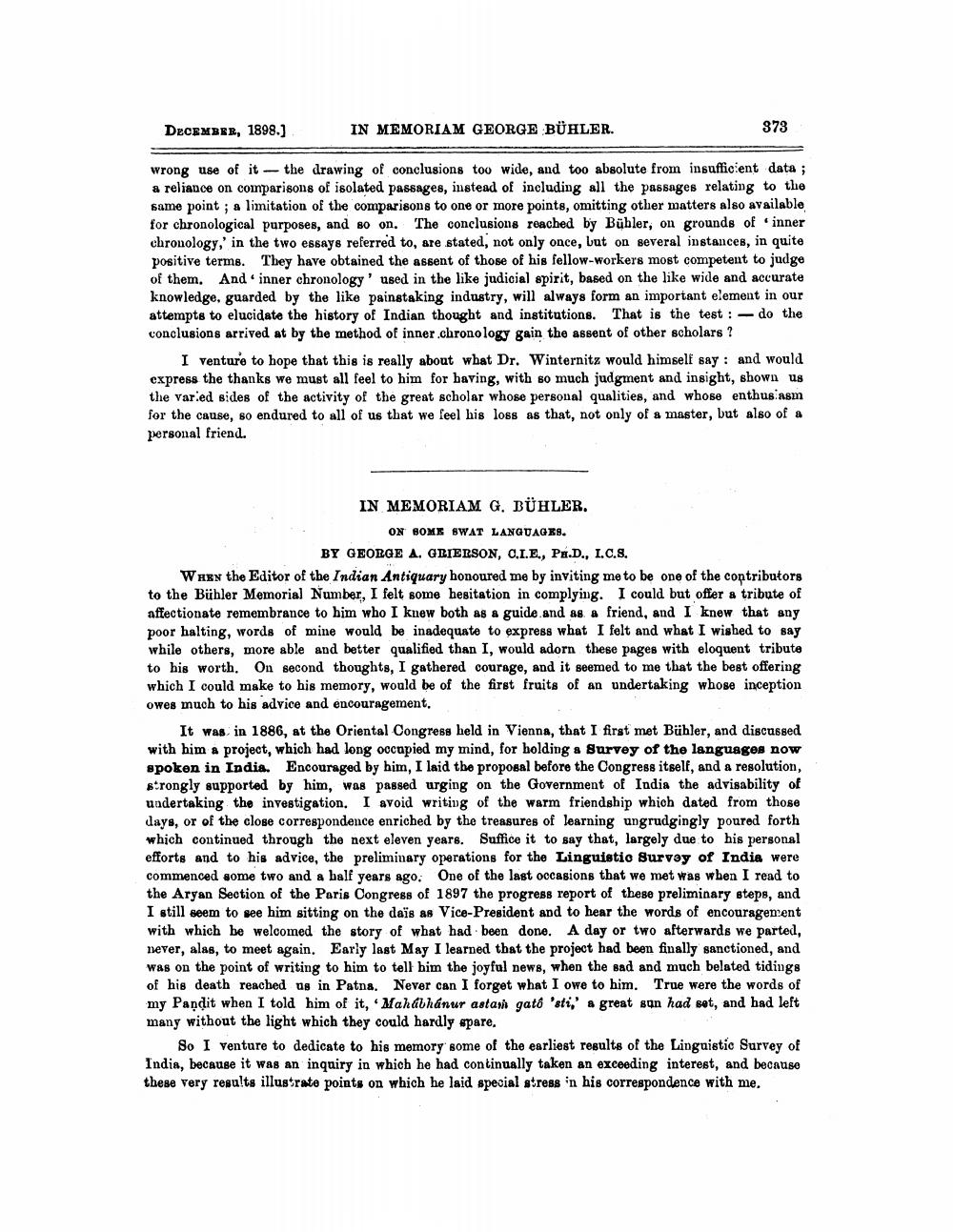________________
DECEMBER, 1898.]
IN MEMORIAM GEORGE BÜHLER.
wrong use of it the drawing of conclusions too wide, and too absolute from insufficient data; a reliance on comparisons of isolated passages, instead of including all the passages relating to the same point; a limitation of the comparisons to one or more points, omitting other matters also available for chronological purposes, and so on. The conclusions reached by Bühler, on grounds of inner chronology,' in the two essays referred to, are stated, not only once, but on several instances, in quite positive terms. They have obtained the assent of those of his fellow-workers most competent to judge of them. And inner chronology' used in the like judicial spirit, based on the like wide and accurate knowledge, guarded by the like painstaking industry, will always form an important element in our attempts to elucidate the history of Indian thought and institutions. That is the test: do the conclusions arrived at by the method of inner chronology gain the assent of other scholars ?
373
I venture to hope that this is really about what Dr. Winternitz would himself say: and would express the thanks we must all feel to him for having, with so much judgment and insight, shown us the varied sides of the activity of the great scholar whose personal qualities, and whose enthusiasm for the cause, so endured to all of us that we feel his loss as that, not only of a master, but also of a personal friend.
IN MEMORIAM G. BÜHLER.
ON SOME SWAT LANGUAGES.
BY GEORGE A. GRIERSON, C.I.E., PH.D., I.C.S.
WHEN the Editor of the Indian Antiquary honoured me by inviting me to be one of the contributors to the Bühler Memorial Number, I felt some hesitation in complying. I could but offer a tribute of affectionate remembrance to him who I knew both as a guide and as a friend, and I knew that any poor halting, words of mine would be inadequate to express what I felt and what I wished to say while others, more able and better qualified than I, would adorn these pages with eloquent tribute to his worth. On second thoughts, I gathered courage, and it seemed to me that the best offering which I could make to his memory, would be of the first fruits of an undertaking whose inception owes much to his advice and encouragement.
It was in 1886, at the Oriental Congress held in Vienna, that I first met Bühler, and discussed with him a project, which had long occupied my mind, for holding a Survey of the languages now spoken in India. Encouraged by him, I laid the proposal before the Congress itself, and a resolution, strongly supported by him, was passed urging on the Government of India the advisability of undertaking the investigation. I avoid writing of the warm friendship which dated from those days, or of the close correspondence enriched by the treasures of learning ungrudgingly poured forth which continued through the next eleven years. Suffice it to say that, largely due to his personal efforts and to his advice, the preliminary operations for the Linguistic Survey of India were commenced some two and a half years ago. One of the last occasions that we met was when I read to the Aryan Section of the Paris Congress of 1897 the progress report of these preliminary steps, and I still seem to see him sitting on the daïs as Vice-President and to hear the words of encouragement with which he welcomed the story of what had been done. A day or two afterwards we parted, never, alas, to meet again. Early last May I learned that the project had been finally sanctioned, and was on the point of writing to him to tell him the joyful news, when the sad and much belated tidings of his death reached us in Patna. Never can I forget what I owe to him. True were the words of my Pandit when I told him of it, Mahabhánur astam gatô 'sti,' a great sun had set, and had left many without the light which they could hardly spare.
So I venture to dedicate to his memory some of the earliest results of the Linguistic Survey of India, because it was an inquiry in which he had continually taken an exceeding interest, and because these very results illustrate points on which he laid special stress in his correspondence with me.




